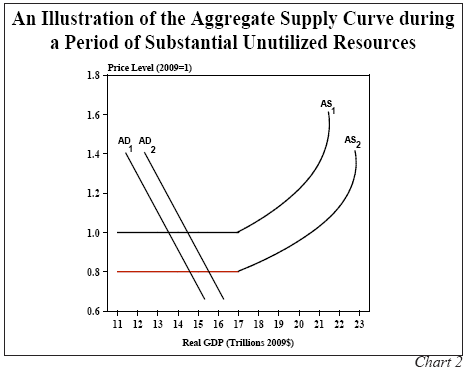OK, it is time to put an end to this silliness. Certain people who believe every conspiracy that comes down the pike believe that America's future is Zimbabwe, where hyperinflation hit 79.6 billion percent. In fact, by one estimate, inflation in Zimbabwe hit an annualized return of 430,000,000,000,000,000,000,000,000,000,000,000,000%. I don't even know how to pronounce that number.
Now, it should be apparent why comparing America to Zimbabwe is pretty silly. Unfortunately, alarmists pray on the gullible, and sometimes the gullible can be persuasive to the less gullible. Normally I don't go to all the time and effort to do this, but since I've been called out, I thought it would be appropriate to do so.
The reason why people believe hyperinflation is coming is because of the rapid expansion of the balance sheet of the Federal Reserve, particularly graphs that look like this.

This is a graph of the monetary base. The monetary base is also known as "high-powered money." It is the total amount of currency in circulation, bank reserves and central bank reserves. Reserves are the base upon which loans are made in the economy. In a fractional banking system such as ours, if reserves rise, then there is more money to lend. This, all else being equal, is inflationary. Here is a graph of excess reserves in the banking system.

These are the non-borrowed reserves of the banks, that is not borrowed from the Fed and other banks.

This is why some believe high inflation is coming. A massive increase in reserves should equal a massive increase in the money supply and thus a massive increase in inflation.
Looks pretty scary, doesn't it? And it is, all else being equal. But as we will see, all else is not equal.
Now, notice in the graph immediately above. See how it dips to more than -$300 billion? We will return to this in a bit.
But first, let us look at what has actually happened to the money supply. With the massive increase in reserves, has there been a corresponding increase in money?
This is a graph of M1. M1 is all the currency, checking accounts and travelers checks. As you can see, M1 has risen but not much more than it did in 1987 or 2002.

A broader definition of money is M2. M2 is M1 plus deposit accounts, overnight repurchase agreements, overnight Eurodollar deposits, small time deposits and retail money market funds. This is a graph of M2.

Now, M2 has risen, but it has not risen as much as it did in 1983 or 2003.
M3 is the broadest definition of money. M3 is M2 plus large time deposits, institutional money market funds, large long-term repurchase agreements and large Eurodollar deposits. Unfortunately, the Fed stopped publishing this data a few years back. The conspiracy theorists say they did this to hide the inflation in the system. The conspiracy theorists may be right. However, M3 has tracked the directional change of M1 and M2 plus a some percentage change more. It is not rising at an astronomical rate that would have to occur to think hyperinflation is coming. Here is a graph of institutional money market funds, which is a component of M3.

Institutional money funds are rising at a faster rate than M2, about 25% per year. However, that is not much faster than M1. And as we see in the M1 and M2 graphs, the money supply often increases around a recession, which is typical monetary policy by the Fed to fight a recession.
So, has inflation come?
Consumer Price Index Summary
Inflation has fallen 1.3%. We have deflation, not inflation.
Why is that? Because a collapse in asset prices, whether that is in stocks, bonds, housing, or whatever, is deflationary because a fall in asset prices destroys the credit used to finance the rise in asset prices. In a fiat monetary system, the supply of money is a function of the amount of credit in the economy. When credit collapses, as it has over the past two years, prices fall. That is how it always works.
"But the actions of the Fed are planting the seeds of future hyperinflation" is what they will say. Yes, that is true, all else being equal. But things are not equal, and this is why.
First, what is known as "monetary velocity" or the money multiplier has collapsed.

Monetary velocity measures the rate at which money circulates in the economy. Think about an extreme example. Let's say the money multiplier fell to zero. That would mean that all transactions stopped. What would happen? The economy would collapse and prices would implode. When the money multiplier falls, it has a deflationary effect.
So why is it falling? Remember those graphs of the banking reserves above? It is because banks are hoarding money. And why are banks hoarding money? Because they believe there are more losses to come and they will need the reserves to cover the losses.
http://www.advisorperspectives.com/...-Bank_Write-offs_are_at_the_Halfway_Point.pdf
So all those reserves are being held to pay future costs. This isn't inflationary because that money will disappear. In fact, the $1 trillion in estimated losses approximates the expansion of the Fed's balance sheet.
FRB: H.4.1 Release--Factors Affecting Reserve Balances--June 11, 2009
The Fed has increased its reserves to inject reserves into the banking system to cover the losses. The Fed is merely replacing credit in the economy that has been destroyed.
Bank credit has fallen

But more importantly, the shadow banking system has collapsed. What is the shadow banking system?
shadow banking system Definition
The shadow banking system is enormous.
Reducing Systemic Risk in a Dynamic Financial System - Federal Reserve Bank of New York
I tried to find some data on losses in the shadow banking system. A couple of bond investors whom I spoke with thought it ran in the trillions.
So we have $1 trillion in losses in the banking system and "trillions" in the shadow financial system. Yet, the Fed has expanded its balance sheet by $1 trillion, trillions less than what has been lost. The expansion of the Fed's balance sheet has not been enough to replace the credit destroyed in the private economy. Thus, the expansion of the Fed's balance sheet is not inflationary. It cannot become inflationary until the credit that has been destroyed is replaced by new credit.
And when will credit start expanding in the private economy? Only when the economy starts improving. For the economy to start improving, for credit to expand, and for inflation to start rising, the following must happen.
Employment, Interest, and Money: A Long Way to Inflation
Capacity utilization is sitting at an all-time low.

As long as there is excess capacity, i.e. capacity utilization is low, there will not be any inflation, as you can see in this graph.

The savings rate is rising.

If inflation were coming, then the yields for Treasury Inflation-Protected Securities (TIPS) would be off the charts. They are not. This is the yield for a 30-year TIPS bond.

Corporate bond rates would be going through the roof if hyperinflation was imminent. They are not.


So there is no evidence, nor is there any reason to think that hyperinflation is coming. It is shrill hysteria to think so.
Is inflation coming? Probably. There will be no inflation if the government starts withdrawing liquidity, i.e. reserves, from the financial system. Historically, however, there has usually been a lag between when monetary policy should and does work. Thus, it is likely that the Fed will wait too long to start tightening the money supply, which would lead to inflation down the road.
5% inflation, or maybe 10% inflation. But not 79,600,000,000% inflation.
Now, if you have read this entire post, congratulations. You are probably the only one.
Now, it should be apparent why comparing America to Zimbabwe is pretty silly. Unfortunately, alarmists pray on the gullible, and sometimes the gullible can be persuasive to the less gullible. Normally I don't go to all the time and effort to do this, but since I've been called out, I thought it would be appropriate to do so.
The reason why people believe hyperinflation is coming is because of the rapid expansion of the balance sheet of the Federal Reserve, particularly graphs that look like this.

This is a graph of the monetary base. The monetary base is also known as "high-powered money." It is the total amount of currency in circulation, bank reserves and central bank reserves. Reserves are the base upon which loans are made in the economy. In a fractional banking system such as ours, if reserves rise, then there is more money to lend. This, all else being equal, is inflationary. Here is a graph of excess reserves in the banking system.

These are the non-borrowed reserves of the banks, that is not borrowed from the Fed and other banks.

This is why some believe high inflation is coming. A massive increase in reserves should equal a massive increase in the money supply and thus a massive increase in inflation.
Looks pretty scary, doesn't it? And it is, all else being equal. But as we will see, all else is not equal.
Now, notice in the graph immediately above. See how it dips to more than -$300 billion? We will return to this in a bit.
But first, let us look at what has actually happened to the money supply. With the massive increase in reserves, has there been a corresponding increase in money?
This is a graph of M1. M1 is all the currency, checking accounts and travelers checks. As you can see, M1 has risen but not much more than it did in 1987 or 2002.

A broader definition of money is M2. M2 is M1 plus deposit accounts, overnight repurchase agreements, overnight Eurodollar deposits, small time deposits and retail money market funds. This is a graph of M2.

Now, M2 has risen, but it has not risen as much as it did in 1983 or 2003.
M3 is the broadest definition of money. M3 is M2 plus large time deposits, institutional money market funds, large long-term repurchase agreements and large Eurodollar deposits. Unfortunately, the Fed stopped publishing this data a few years back. The conspiracy theorists say they did this to hide the inflation in the system. The conspiracy theorists may be right. However, M3 has tracked the directional change of M1 and M2 plus a some percentage change more. It is not rising at an astronomical rate that would have to occur to think hyperinflation is coming. Here is a graph of institutional money market funds, which is a component of M3.

Institutional money funds are rising at a faster rate than M2, about 25% per year. However, that is not much faster than M1. And as we see in the M1 and M2 graphs, the money supply often increases around a recession, which is typical monetary policy by the Fed to fight a recession.
So, has inflation come?
The Consumer Price Index for All Urban Consumers (CPI-U) increased
0.3 percent in May before seasonal adjustment, the Bureau of Labor
Statistics of the U.S. Department of Labor reported today. Over the last
12 months the index has fallen 1.3 percent.
Consumer Price Index Summary
Inflation has fallen 1.3%. We have deflation, not inflation.
Why is that? Because a collapse in asset prices, whether that is in stocks, bonds, housing, or whatever, is deflationary because a fall in asset prices destroys the credit used to finance the rise in asset prices. In a fiat monetary system, the supply of money is a function of the amount of credit in the economy. When credit collapses, as it has over the past two years, prices fall. That is how it always works.
"But the actions of the Fed are planting the seeds of future hyperinflation" is what they will say. Yes, that is true, all else being equal. But things are not equal, and this is why.
First, what is known as "monetary velocity" or the money multiplier has collapsed.

Monetary velocity measures the rate at which money circulates in the economy. Think about an extreme example. Let's say the money multiplier fell to zero. That would mean that all transactions stopped. What would happen? The economy would collapse and prices would implode. When the money multiplier falls, it has a deflationary effect.
So why is it falling? Remember those graphs of the banking reserves above? It is because banks are hoarding money. And why are banks hoarding money? Because they believe there are more losses to come and they will need the reserves to cover the losses.
US banks and brokerage firms have written-off
approximately $572 billion in loan losses since the onset of
the credit crisis. But at least another $500 billion will be
written-off over the next two years, as housing prices
plummet and unemployment rises, according to a report
issued by Nouriel Roubini and Elisa Parisi-Capone,
colleagues at the RGE Monitor.
http://www.advisorperspectives.com/...-Bank_Write-offs_are_at_the_Halfway_Point.pdf
So all those reserves are being held to pay future costs. This isn't inflationary because that money will disappear. In fact, the $1 trillion in estimated losses approximates the expansion of the Fed's balance sheet.
FRB: H.4.1 Release--Factors Affecting Reserve Balances--June 11, 2009
The Fed has increased its reserves to inject reserves into the banking system to cover the losses. The Fed is merely replacing credit in the economy that has been destroyed.
Bank credit has fallen

But more importantly, the shadow banking system has collapsed. What is the shadow banking system?
System of non-financial institutions that borrow money in the short term and take that money to invest in long-term assets. Shadow banking systems are able to avoid standard banking regulations through the use of credit derivatives.
shadow banking system Definition
The shadow banking system is enormous.
"In early 2007, asset-backed commercial paper conduits, in structured investment vehicles, in auction-rate preferred securities, tender option bonds and variable rate demand notes, had a combined asset size of roughly $2.2 trillion. Assets financed overnight in triparty repo grew to $2.5 trillion. Assets held in hedge funds grew to roughly $1.8 trillion. The combined balance sheets of the then five major investment banks totaled $4 trillion. In comparison, the total assets of the top five bank holding companies in the United States at that point were just over $6 trillion, and total assets of the entire banking system were about $10 trillion."
Reducing Systemic Risk in a Dynamic Financial System - Federal Reserve Bank of New York
I tried to find some data on losses in the shadow banking system. A couple of bond investors whom I spoke with thought it ran in the trillions.
So we have $1 trillion in losses in the banking system and "trillions" in the shadow financial system. Yet, the Fed has expanded its balance sheet by $1 trillion, trillions less than what has been lost. The expansion of the Fed's balance sheet has not been enough to replace the credit destroyed in the private economy. Thus, the expansion of the Fed's balance sheet is not inflationary. It cannot become inflationary until the credit that has been destroyed is replaced by new credit.
And when will credit start expanding in the private economy? Only when the economy starts improving. For the economy to start improving, for credit to expand, and for inflation to start rising, the following must happen.
1. Output must stabilize.
2. Output must start growing.
3. Output must grow faster than trend productivity.
4. Firms must slow layoffs to the normal rate.
5. Firms must remobilize slack full-time employees (workers who are still on the full-time payroll but aren’t being asked to produce much, because businesses have been trying to reduce inventories).
6. Firms must bring part-time employees back to full time. (This recession in particular has been characterized by the tendency to reduce hours rather than laying off employees.)
7. Hiring (which has been falling rapidly) must stabilize.
8. Hiring must rise to the point where it equals the normal rate of layoffs, to get total employment to start rising.
9. Hiring must become rapid enough that employment starts to grow faster than the population.
10. Hiring must become rapid enough that employment growth is faster than the sum of the population growth & labor force re-entry. In other words, net hiring has to be fast enough to absorb all the workers who will start looking for jobs again once there are more jobs around to look for.
11. The unemployment rate must start declining.
12. The unemployment rate must decline by 4 or more percentage points, which, by historical experience, will take a matter of years.
13. Firms must start competing for labor.
14. Firms must start raising wages.
15. Firms must raise wages faster than trend productivity growth.
Employment, Interest, and Money: A Long Way to Inflation
Capacity utilization is sitting at an all-time low.

As long as there is excess capacity, i.e. capacity utilization is low, there will not be any inflation, as you can see in this graph.

The savings rate is rising.

If inflation were coming, then the yields for Treasury Inflation-Protected Securities (TIPS) would be off the charts. They are not. This is the yield for a 30-year TIPS bond.

Corporate bond rates would be going through the roof if hyperinflation was imminent. They are not.


So there is no evidence, nor is there any reason to think that hyperinflation is coming. It is shrill hysteria to think so.
Is inflation coming? Probably. There will be no inflation if the government starts withdrawing liquidity, i.e. reserves, from the financial system. Historically, however, there has usually been a lag between when monetary policy should and does work. Thus, it is likely that the Fed will wait too long to start tightening the money supply, which would lead to inflation down the road.
5% inflation, or maybe 10% inflation. But not 79,600,000,000% inflation.
Now, if you have read this entire post, congratulations. You are probably the only one.
Last edited:


